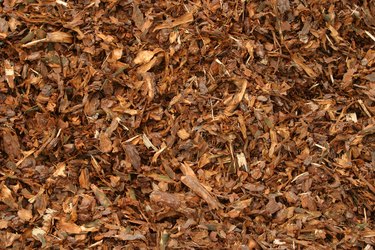
Mulch refers to any material which is used on the surface of the soil to repel weeds. Some of the most common ingredients used as mulch are organic materials such as straw, bark or compost. Though mulch materials vary, they all serve more or less the same purpose of protecting plants and grass from weeds and insects. Mulch is also used because it is disease-resistant. Cedar mulch is considered one of the best for repelling termites. The best cedar mulch is shredded native cedar (Roberts, Kraynak, 2006).
Why Cedar Is Good for Termite Control
Video of the Day
Cedar mulch is an effective termite control because the toxins contained in cedar wood harms the symbiotic relationship that exists between the termite and its wooden habitat. This harm becomes evident with lower rates of survival, physical deformity, reduced size, and later developmental time in the termites feeding on cedar wood (Henry 1967, Koch 1967). The health of termites and their intestines depends upon the species of the wood which they are ingesting. An experiment by Mauldin et.al. (1981) exposed a species of termites to wood from 21 trees from the same region and found that yellow poplar, post oak, magnolia grandiflora and black walnut totally eliminated the termite population and brought their chances of survivorship to less than 2 percent. Similarly the termites feeding on northern white cedar and sycamore lost all symbiotic properties and died before the three-week experiment was completed. There was a 65 percent survival rate seen in termites feeding on eastern red cedar (Barbosa, Letourneau, 1988).
Video of the Day
Advantages of Mulch
Mulch is a highly recommended practice for any landscaping. It should be applied in a 3-to-4-inch layer every time new trees, shrubs or flowers are planted and should be refreshed periodically. Natural cedar mulch not only looks good on the landscape and is biodegradable but also is insect- and disease-repellent. No garden can have too much mulch, since the leftover can be used in the lawn or around the trees and bushes. Mulch also improves rainwater absorption, and helps grass seeds germinate and develop greater absorbency. This in turn protects soil from erosion, decreases the level of evaporation and increases infiltration.